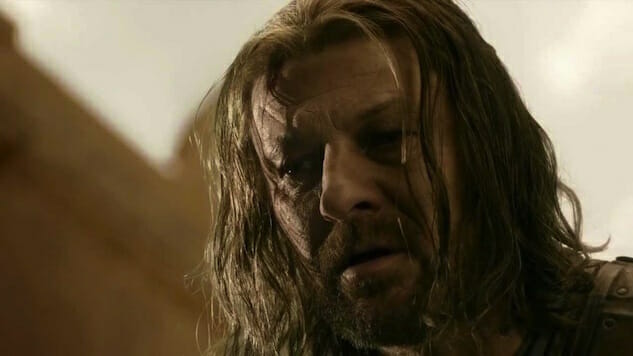Our Favorite Scenes in Game of Thrones: Ned Stark’s Execution, “Baelor”
(Episode 1.09)
Photo: HBO
Editor’s note: This is part of a series of essays revisiting our favorite scenes in HBO’s Game of Thrones. Read the previous installments here.
There really is something spooky about the sound pigeons’ wings make. A person could be forgiven for ascribing some kind of metaphysical meaning to it.
People who tuned in to Game of Thrones as fans of George R.R. Martin’s A Song of Ice and Fire were perhaps prepared for it. Or at least they knew to expect it. For those of us who went into the TV series cold, it was the first conclusive proof that we weren’t going to be able to count on any of the usual narrative conventions. Especially the one where the moral center/main character survives because at some level it’s his story. I didn’t believe Ned Stark was going to lose his head. Not really. How could they do that? Without him, there was no story. Right?
It’s not the goriest death in Game of Thrones by a long mile, but it’s probably still the most shocking. Arya, hiding in the streets of King’s Landing, captures a pigeon and tries to trade it to a baker for food. A commotion erupts and someone tells her the Hand of the King is being taken to the Sept of Baelor. She races to the plaza and climbs the pedestal of the statue of Baelor to get a clear view. From that vantage point, she sees him—and he sees her, in a gut-wrenching zoom, empty sky behind her, milling throngs below. He yells for Yoren, the Night’s Watch brother, to go to the statue. Sansa looks relieved that he’s going to make his false confession of treason. Petyr Baelish watches with a smug inscrutability. For the sake of his daughters, Ned makes a bogus confession that would kill someone so constitutionally honest and just almost as surely as a sword would. It hurts just listening to it. And then… that sadistic little bastard Joffrey breaks his part of the bargain and orders Ned’s execution anyway. We cut to Arya and the camera begins to swirl around the statue, making it look as if she herself is rotating in space. Yoren finds her in the crowd and holds her against his chest so she can’t see what’s happening.
And the unthinkable happens. Right there, on the steps of the cathedral with the whole city watching, her father is beheaded with his own sword. Arya looks up and sees pigeons flying away. A person could be forgiven for thinking of souls leaving bodies, or embodied prayers, or the slipping away of anything, really: hope, dreams, faith, peace, mercy.
-

-

-

-

-

-

-

-

-

-

-

-

-

-

-

-

-

-

-

-

-

-

-

-

-

-

-

-

-

-

-

-

-

-

-

-

-

-

-

-








































